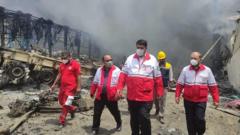In Iran, a massive explosion at the Shahid Rajaee port has incited widespread mourning that is rapidly transforming into public outrage. The blast, which took place on Saturday, has resulted in the deaths of at least 40 people and injuries to over 1,000 more, prompting many to flock to hospitals nationwide to donate blood in response to the crisis. Thick plumes of toxic smoke continue to rise from the still-burning fires at the site, leading the health ministry to caution nearby residents to remain indoors and wear protective clothing.
State television reported that all schools and offices in Bandar Abbas, the closest major city, were ordered closed to concentrate on emergency response efforts. A local festival intended for celebration evolved into a somber memorial for those impacted by the disaster. Authorities declared Monday a day of national mourning, with an additional two days observed in Hormozgan province.
As the nation grieves, a blame game is emerging regarding the cause of the explosion. The private maritime risk consultancy Ambrey Intelligence attributed the incident to potential mishandling of materials, suggesting that the fires that preceded the explosion were linked to the storage of solid rocket fuel. Reports circulated that the explosive was sodium perchlorate, widely used in missile technology, fueling public speculation about military negligence in storing dangerous materials at the port, a claim the Iranian military denied.
The government's response, including President Masoud Pezeshkian’s visit to the site and an investigation initiated into the blast, highlights growing concern among citizens. Many are questioning how such hazardous materials could remain inadequately secured in a hub that handles around 80% of the nation's imports. Economic implications are also significant as authorities warned of possible food shortages due to the port's operational disruption, although later reassurances indicated that sections of the port remained functional.
Internationally, condolences have poured in, including expressions of sympathy from nations such as the UAE, Pakistan, and Russia, amid an ongoing humanitarian response. Meanwhile, there are fears that the incident may complicate diplomatic discussions, with Iranian and U.S. delegations engaged in high-level negotiations in Oman, aimed at Tehran's nuclear program. Despite the turmoil, Iran insists its nuclear agenda remains civilian-focused, refraining from halting its uranium enrichment activities.

















